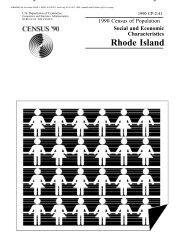Untitled - Rhode Island Historical Society
Untitled - Rhode Island Historical Society
Untitled - Rhode Island Historical Society
Create successful ePaper yourself
Turn your PDF publications into a flip-book with our unique Google optimized e-Paper software.
g<br />
:::<br />
= =:<br />
...:<br />
:::<br />
,::<br />
:.'.<br />
=<br />
= ::'<br />
a.<br />
-t:<br />
-:.<br />
=*<br />
=<br />
€<br />
= €-<br />
€<br />
=-<br />
t20 "\7AS SHE CLOTHED \TITH THE RENTS PAII) FOR THESE \TRETCHED ROOMS?<br />
of all economic situations joined together to weave their cloth. After she builds<br />
a considerable dowry through years of work, Hester and the unassertive<br />
Shubael do marry, but shubaei dies intestate shortly thereafter. Although their<br />
house and its furnishings have all been paid for by Hester with her own earnings,<br />
the prevailing law allows her onry one-third of the property, with<br />
one-third going to each of Shubael's brothers. when her brothers-in-law claim<br />
their two-thirds share, Hester promptly burns down the house and its contents<br />
and is sent to prison for arson.<br />
This foray into the world of quaint New Engrand farm folk, complete with<br />
country accents and a stubborn heroine, marked the closest that Lillie wyman<br />
would come in her fiction to the pastoral local color of her contemporaries<br />
Mary r7ilkins Freeman and Sarah orne Jewett. Like chace's yankee forebears,<br />
the women in "Hester's Dower" are sturdy and enterprising. Nothing could be<br />
more quintessentially symbolic of New England women's bonding than the<br />
ritual baking of brown bread-shared in by a poor woman, a spinstress, and a<br />
more prosperous farm wife-that wyman's story lovingly describes.r' The idyllic<br />
life depicted in the story is disrupted not (as in chaceb recollection of village<br />
life) by the coming of immigrants to the factory but by Hesrer,s inequitable<br />
treatment under the law. choosing to destroy her home in order to preserve her<br />
independence and dignity, Hester becomes a penniless felon. Arthough at the<br />
end of the story her nemesis, her brother-in-law Jeremiah, is gored by a bull and<br />
Hester takes over the rearing of his orphaned child, it is ultimately not a hopeful<br />
conclusion, for the basic inequities suffered by women ..-uirr.<br />
If "Hester's Dower" was a departure into the fabled territory of early agrarian<br />
New England, with "And Joe," published in the Atlantic Monthly the flilowing<br />
month, wyman was back in familiar territory.se More than uny o,h., story that*<br />
she would write during the 1880s, "And Joe,' most deftly illustrated the ideas<br />
her mother had put forth in "Factory'women and Girls.,, The centrar characters<br />
of "And Joe"' however, are not factory operatives but a woman physician,<br />
Margaret Denton, and her friend, Theodora Justice, the daughter of a manufacturer.<br />
when the bored rheodora accompanies Margaret o' h., rounds, she wit-<br />
nesses an inrerview between the physician and a half-witted epileptic boy, Joe,<br />
who is living on the streets. Enduring the rude catcalls of his companions when<br />
she decides to take him to her home, she is struck by a sudden insight, ,,They<br />
were not many rods from her home," she reflects. .,Ifas it God,s fault, or was it<br />
partly hers' that men and manners changed thus, as one went .down street,<br />
from her dwelling?"60<br />
As Theodora invesrigates Joe's situation by speaking to his mother and other<br />
relatives, she learns much about the squalid conditions-overcrowded housing,<br />
frequent changes of residence, intemperance, poverty-under which factory<br />
workers and their families live their lives. overw-helmed, she wonders if there is<br />
lnything she can do'to help Joe. "Dear,l' Margaret teils:her, ,,ought you not to<br />
know your operarives, and seek to be their.frr.nd, u,adht -er.iy. thelf,,.mis- ,,::,,i:,<br />
tress ? " When Theodoia, questions whaiher,ri ,i 'i6diie,eonia Ui;iiiirn*,,i, :r<br />
well as the operarives she might befriend, Margaret is unequivocal. ..you need<br />
some one to work for," she replies, and as for Joe, ,,It may be God made him to<br />
keep you from aimless idleness."61 Here wyman was restating her mother,s mes,<br />
sage to young middle- and upper-class "factory daughters',: there were mutual<br />
benefits to be had in connections between the classes.











